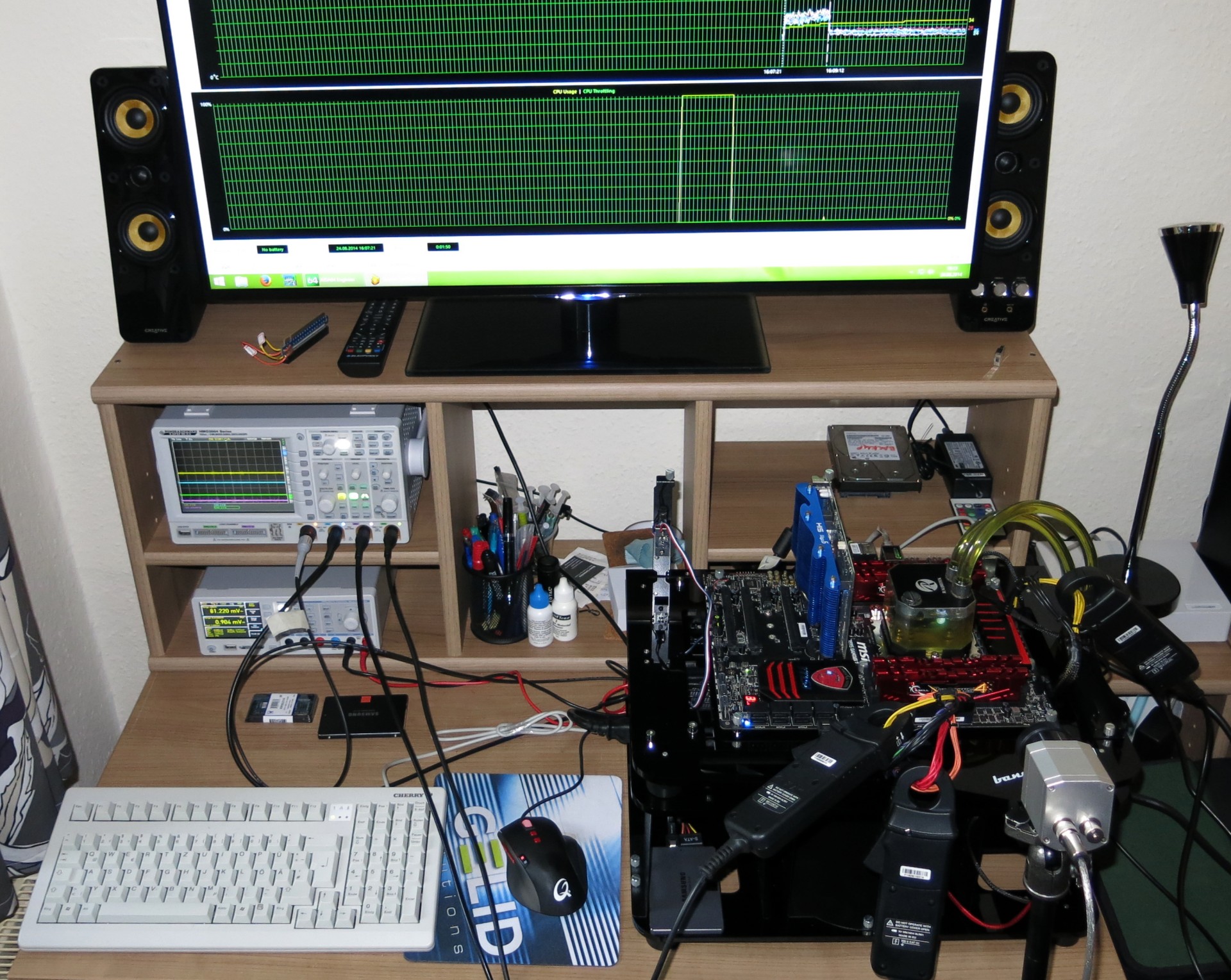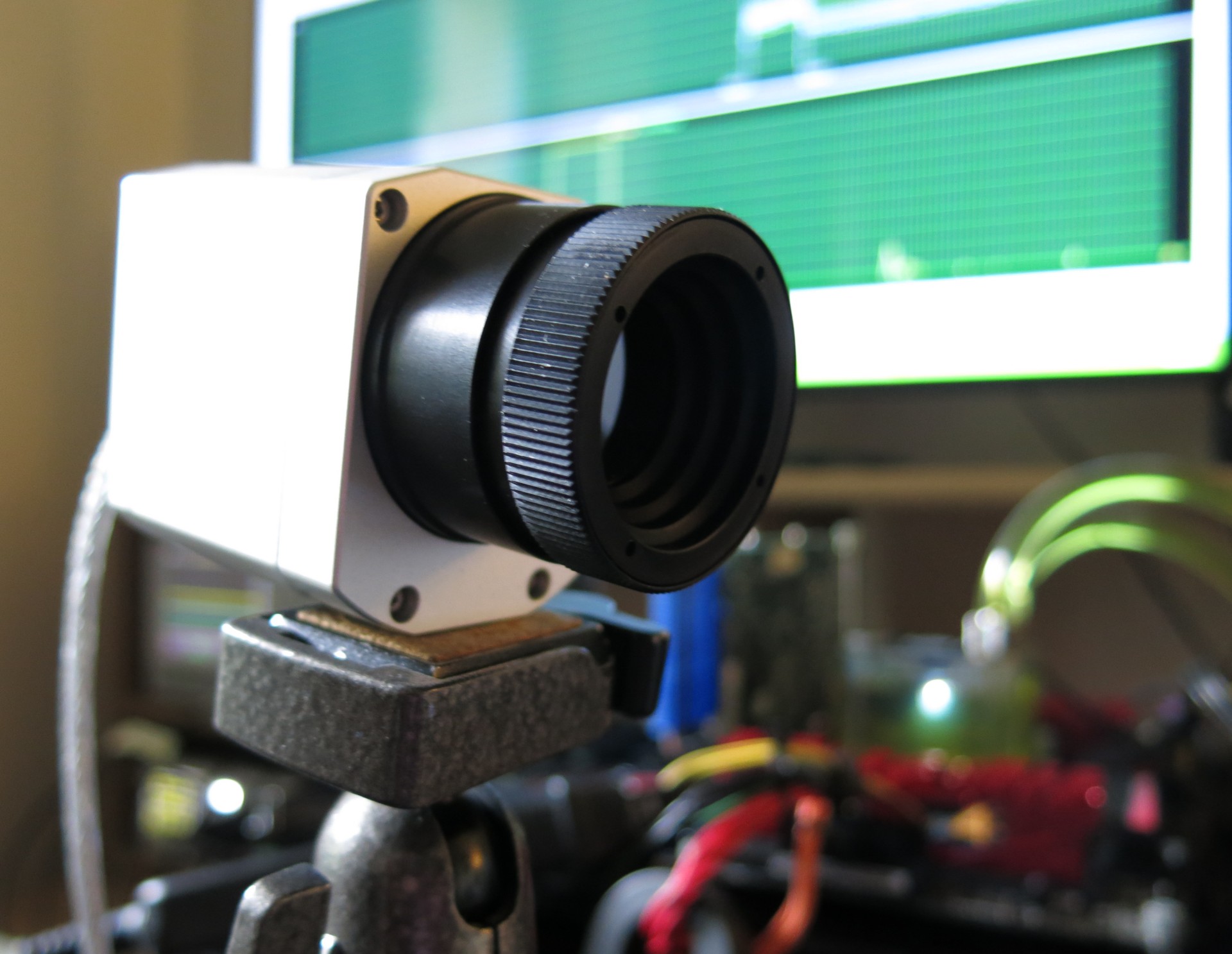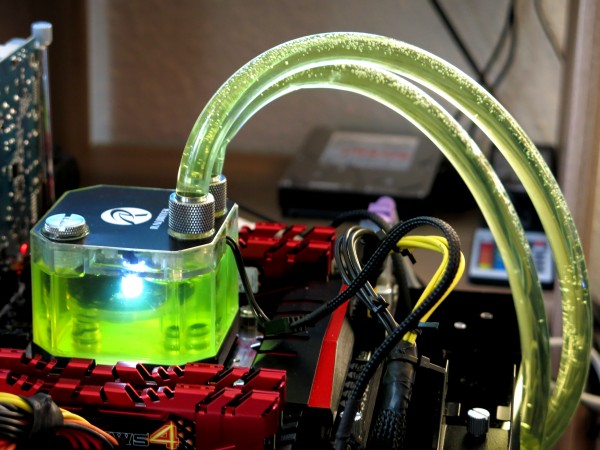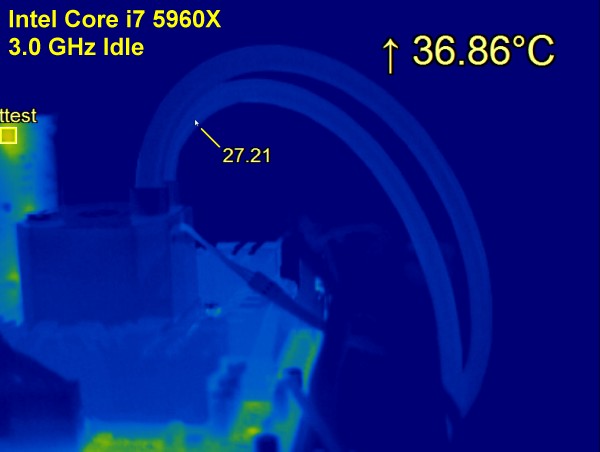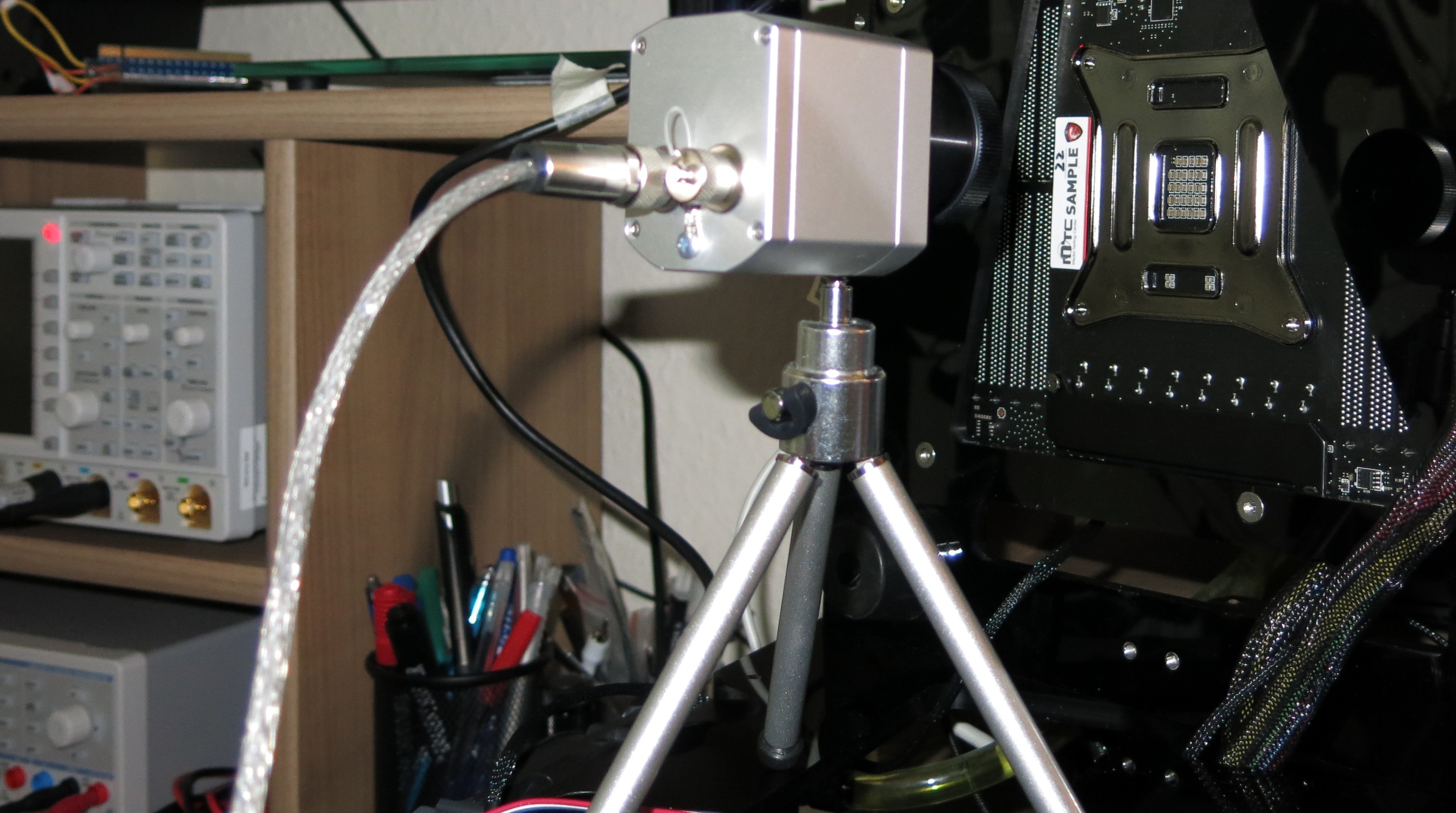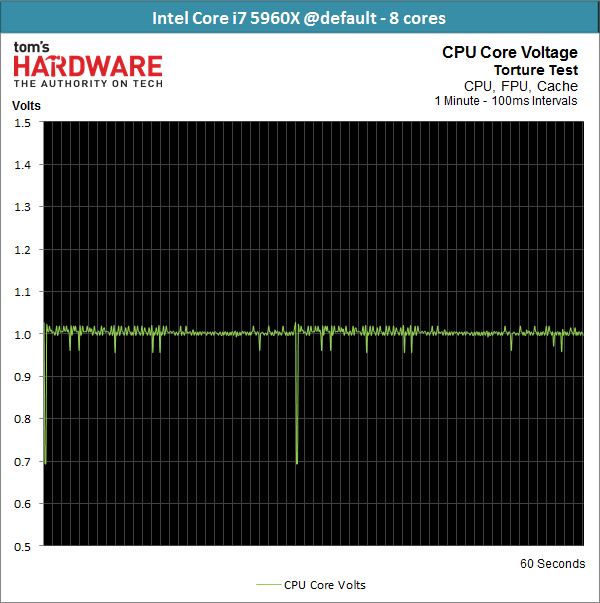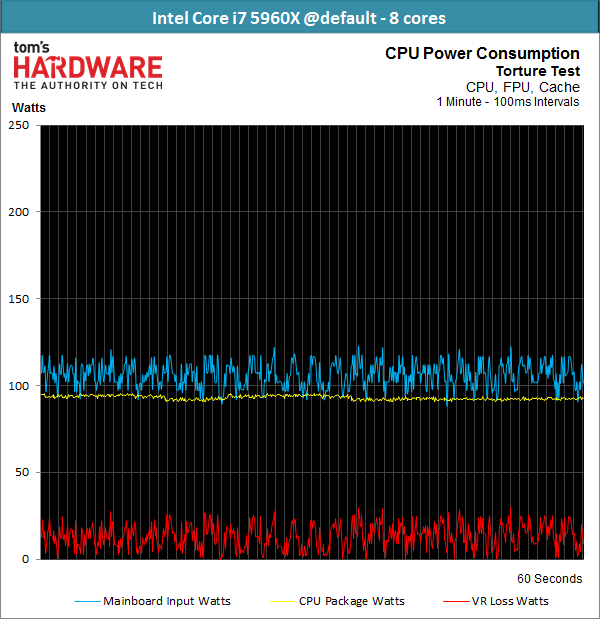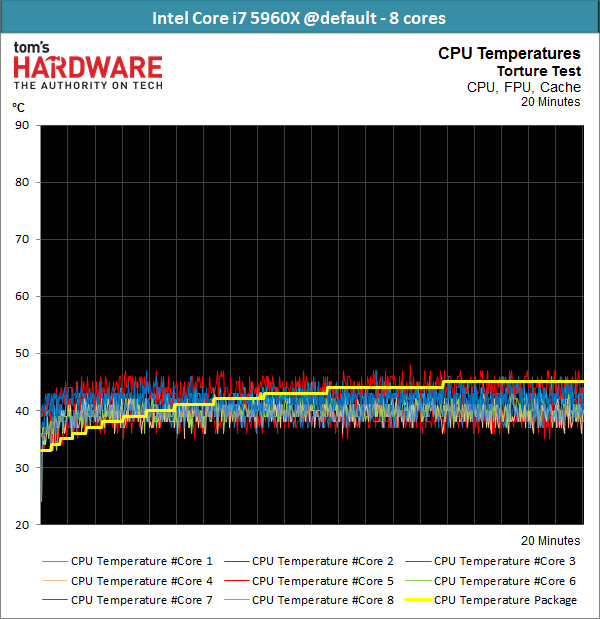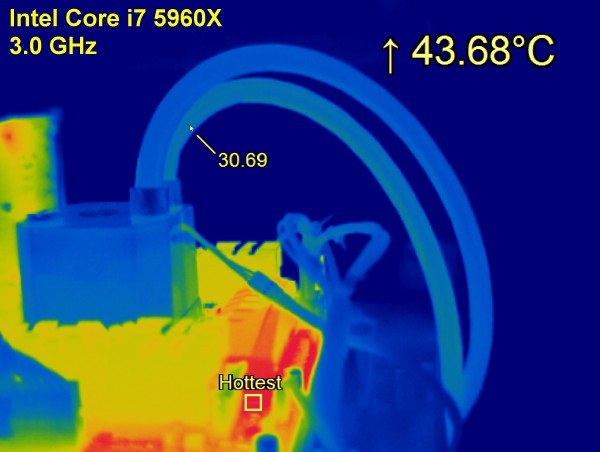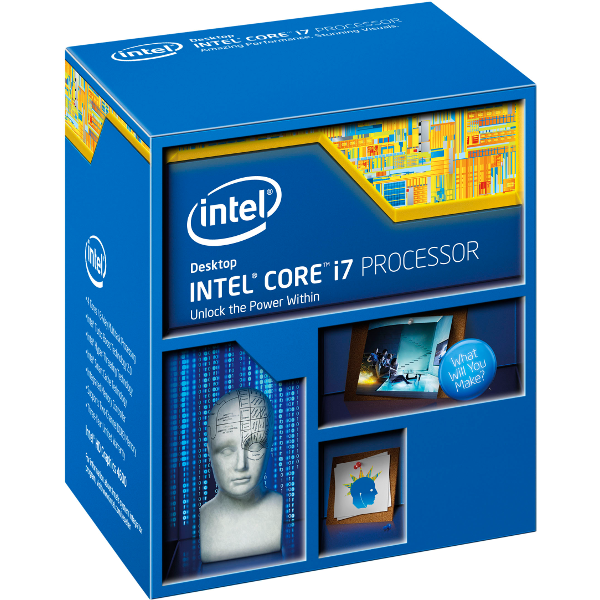Intel Core i7-5960X, -5930K And -5820K CPU Review: Haswell-E Rises
Power, In Depth: Stock Clock Rates
Our German lab went the extra mile for drilling down into power consumption, cutting the braiding from our power supply's cables to give us the same measurement capabilities you've seen in our graphics card launch coverage. The readings are based on the four-channel HAMEG HMO 3054 oscilloscope.
Consumption is measured at two different points, allowing us to, for the first time, quantify how much power is lost to the voltage regulators. This amount isn’t negligible; we’re providing infrared measurements as well to drive that point home.
| Power Measurement Platform | |
|---|---|
| System | Intel Core i7-5960XMSI X99 Gaming 716 GB G.Skill Ripjaws DDR4-2666 (4 x 4 GB)Samsung 850 EVO 512 GBRaijintek Water Coolingbe quiet! Dark Power Pro 1200 WMicrocool Banchetto 101 |
| Method | No Contact Current Measurement at All RailsDirect voltage measurement IR real-time monitoring |
| Equipment | 1 x HAMEG HMO 3054, 500 MHz four-channel oscilloscope with data logger 4 x HAMEG HZO50 current probe 4 x HAMEG HZ355 (10:1 probe, 500 MHz) 1 x HAMEG HMC 8012 DSO with data logger 1 x Optris PI450 80 Hz Infrared Camera + PI Connect |
Infrared Measurements with the Optris PI450
Interestingly, we’ve identified a method to confirm what our sensors tell us in the form of the PI450 by Optris.
This piece of equipment is an infrared camera that was developed specifically for process monitoring. It supplies real-time thermal images at a rate of 80 Hz. The pictures are sent via USB to a separate system, where they can be recorded as video. The PI450’s thermal sensitivity is 40 mK, making it ideal for assessing small gradients.
In order to overclock our CPU even more aggressively, we’re using a new water cooling solution by Raijintek. Consequently, we’re not just interested in the CPU temperature, but also the water temperature, which stays constant after the heat-up phase.
Additionally, the Banchetto 101 allows us to switch the system to a vertical orientation with the use of two angled brackets. This way, we can shoot interesting videos of the back of the motherboard as well. For this, we speed up 20 minutes of HD video so that it completes in two minutes. We record the back of the CPU socket and the voltage regulators to document the heat generation and transmission.
Intel Core i7-5960X at 3.0 GHz with Turbo Boost
Core Voltage
The first experiment involves core voltage. Our measured average of 1.0 V is a bit higher than the motherboard's setting, but we're getting an average of 3.2 GHz from this eight-core processor, so there's hardly room for complaint.
Get Tom's Hardware's best news and in-depth reviews, straight to your inbox.
Power Draw
Next, we compare the values measured through the voltage regulator's sensor to those measured at the motherboard's input (at the same time). This tells us how much power is lost to factors other than the Core i7 processor. These findings will come in useful later, since losses attributable to voltage regulation needs to be taken into consideration when deciding on an optimal system setup.
The eight-core CPU looks pretty good, demonstrating 15 W (19 W, given VRM losses) at idle and 93 W (106 W, considering the VRM) under load.
| Power Consumption | Average, Idle | Maximum, 100% Load | Average, 100% Load |
|---|---|---|---|
| CPU 12 V In | 19 W | 122 W | 106 W |
| CPU Package | 15 W | 96 W | 93 W |
| VR Loss | 4 W | 26 W | 13 W |
Temperatures
Due in no small part to our liquid cooling system, idle temperatures are pleasantly low. The processor interface reading was 32 degrees Celsius, and the core temperature average 27 degrees. That was only five degrees above ambient.
Let’s take a look at the time-lapse video mentioned earlier.
| Temperature T | Idle | Maximum, 100% Load | Average, 100% Load (Heated Up) |
|---|---|---|---|
| Core | 27 °C | 44 °C | 41 °C |
| Package | 27 °C | 45 °C | Row 1 - Cell 3 |
| Water (In / Out) | 24 °C / 27 °C | 31 °C | Row 2 - Cell 3 |
| VR | 34 °C | 44 °C | Row 3 - Cell 3 |
Now, what happens when the CPU is overclocked, and how much can be saved by utilizing two cores less? Those questions are answering by varying our efforts to tune Intel's new flagship.
For an eight-core processor that runs stable at 3.2 GHz with all cores at full load, 93 W (or 106 W with VR losses taken into account) isn't bad.
Current page: Power, In Depth: Stock Clock Rates
Prev Page Star Swarm, Thief, Tomb Raider, And WoW Next Page Power, In Depth: Eight and Six Cores at 3.5 GHz-
B4vB5 Chris and Igor @ TomsHW,Reply
Bit disappointed to not see a comparison with the Xeon E5-1650v2(or 1660v2), as the 2600 is a bit overkill comparing prices. Some of us just need a workstation with ECC ram and not just a free-for-all(ie someone else is paying) Xeon 2600 fest. -
JamesSneed Out of curiosity why were so many of the gaming tests only done at 2560x1440? Seems like you would be more GPU bound at this resolution. I'm not sure it really matters but I do like gaming at 1080p for the very high frame rates was curious if these would push frame rates higher. Otherwise nice review.Reply -
ohim Reply14063555 said:Affordable 8-cores from Intel are finally coming. Awesome.
1000$ is affordable to you ? :))
14063653 said:Out of curiosity why were so many of the gaming tests only done at 2560x1440? Seems like you would be more GPU bound at this resolution. I'm not sure it really matters but I do like gaming at 1080p for the very high frame rates was curious if these would push frame rates higher. Otherwise nice review.
Though you have a point here, the guy buying such CPUs most likely will game at above 1080p .. but this would have implied using 2 GPUs at least in the test. -
chiefpiggy Why do they call these their "5th generation" of Intel core processors if they're refreshes of the Haswell processors? I get that they have revolutionary technology within but with the release of broadwell so soon I doubt that anyone would buy these processors..Reply -
envy14tpe I need this system to play Minecraft. with that aside, Intel finally has made a jump in i7s value and performance.Reply -
srap "Single-threaded software is so last decade, though."Reply
I have a hunch that we will never see anything like this in the comment sections of AMD reviews. Not sure why :D -
CaptainTom Yeah the real winner of a cpu here is definitely the 5820K. If I were building now, that is what I would use.Reply
